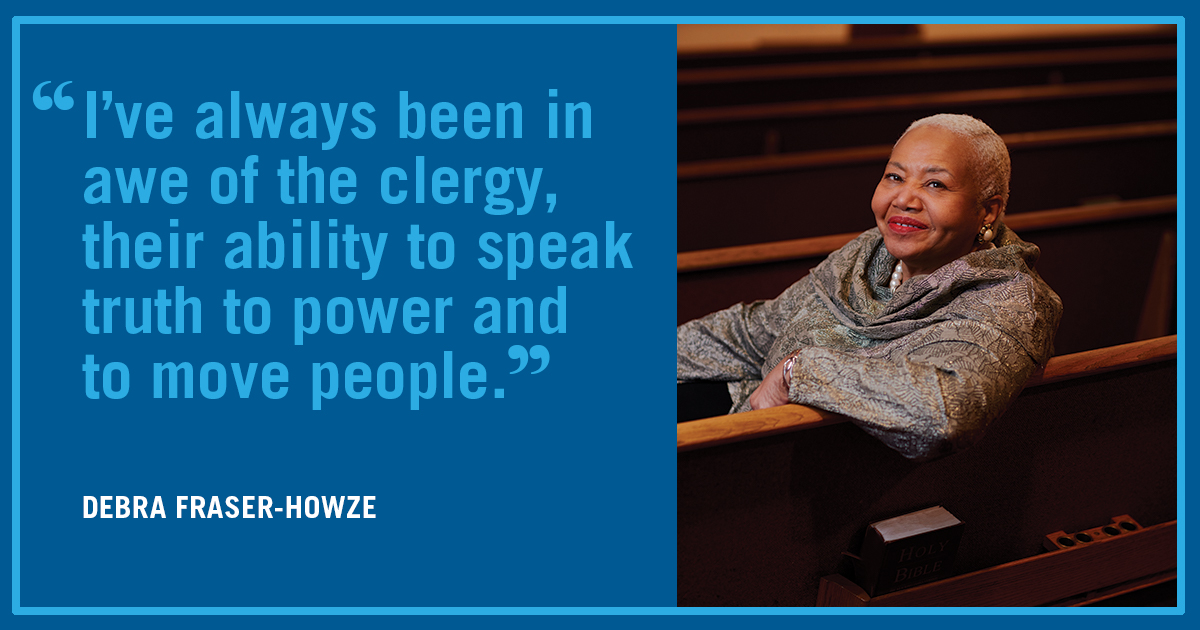
Called To Action
As a child, Debra Fraser-Howze learned that community members take care of each other. For decades, feet on the ground, Fraser-Howze has put that conviction into action, serving the underserved. In January of this year, having amassed the support of public health officials, nonprofit and private organizations, and most importantly a powerful cadre of Black clergy from five cities, she launched Choose Healthy Life, an initiative aimed at tackling the COVID crisis in Black communities.
By Anndee Hochman
Photographs by Matt Carr
Last winter’s news felt grimly familiar to Debra Fraser-Howze: A deadly, highly transmissible disease that was spreading with alarming speed. A president who dismissed the threat. Wildfires raging across Australia while sheets of polar ice slipped into the oceans. She thought about the HIV/AIDS crisis of the 1980s and ’90s. She felt haunted by images of Hurricane Katrina—“my people being swept up by the water from the levees.” She knew—even though few were collecting such data yet—that the coming epidemic would hit people of color hardest.
So Fraser-Howze, an activist, organizer, and global leader in public health and social welfare, did what she always does when confronted with injustice: She called her people, and she made a plan. “I decided I needed to do something,” Fraser-Howze, 68, recalls. “It’s the kind of passion that drives you in the face of adversity—[the feeling that] somebody’s got to stand up.”
She reached out to professors at the Moravian Theological Seminary, where she is pursuing a master’s degree in theological studies. She got in touch with the Black pastors she’s known for decades, ever since forming the National Black Leadership Commission on AIDS (NBLCA) in 1987. She tapped her contacts in public health, including Dr. Anthony Fauci, now chief medical advisor to the Biden administration. Fraser-Howze knew that a robust effort to fight COVID in the Black community would require nonprofit organizations and the private sector, as well: Ultimately, United Way of New York City, Resolve to Save Lives (a global public health initiative), and Quest Diagnostics came aboard with expertise and millions in both funding support and in-kind services.
Her idea was to mobilize Black pastors and churches to respond to the pandemic with education, COVID testing and vaccine information, contact tracing, support, and most importantly public health navigators to ensure that those most in need would receive the necessary care. Throughout 2020, as infection rates climbed and Black Americans died from COVID at a rate nearly twice that of non-Hispanic whites, Fraser-Howze and her team mapped out a structure. Together, they brainstormed a name: Choose Healthy Life nods to the “choose life” exhortation in the book of Deuteronomy.
The initiative marries faith and science, the power of Black clergy with the pragmatism of public health authorities. It involves 50 churches in five cities—Atlanta, Detroit, New York, Newark, and Washington, D.C.—and aims to address not only the COVID crisis but the underlying health, economic, and social inequities that make people of color more vulnerable to the disease. It is the latest project in Fraser-Howze’s lifelong quest to ensure that everyone—no matter their age, race, or personal history—has a chance to thrive. “You can’t think about throwing anybody away,” she says. “Everybody has their worth. Everybody’s important.”
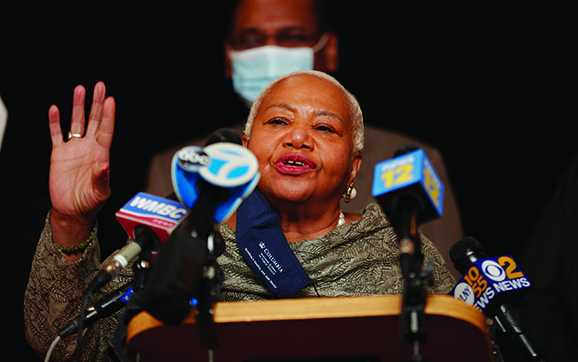
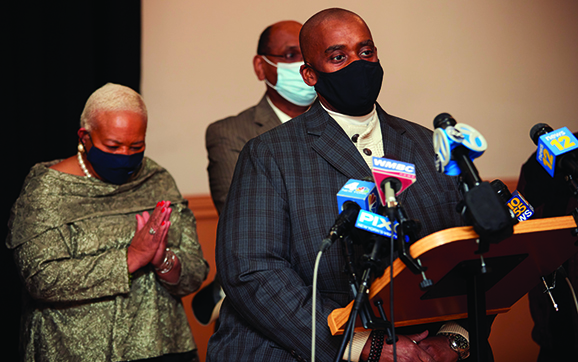
(Left) Debra Fraser-Howze, founder of Choose Healthy Life, speaks before the group assembled for a COVID vaccination event at Metropolitan Baptist Church’s Willing Heart Community Care Center in Newark, New Jersey.
(Right) Rev. Ralph M. Branch Jr., pastor of the Mount Calvary Missionary Baptist Church in Newark, offers remarks to the press gathered at the vaccination event.
Raised in Two Worlds
That was a message Fraser-Howze absorbed at the feet of her family, in the disparate worlds of Harlem and the South Bronx, where she was raised, and the Charleston, South Carolina, home of her grandparents, where she spent nearly every summer. In Harlem, her role models—teachers, preachers, doctors—were all Black. In Charleston, she had to drink from the water fountain designated for “colored people” and was forbidden to try on shoes in certain stores. But in both places, Fraser-Howze felt nurtured. “What I learned from my childhood was the importance of community, and how the community takes care of each other. I come from a long line of educators. People were always in the house; there was always an intellectual discussion.”
The church anchored both worlds. “In Charleston, we were Baptists,” she says. “In New York, because my mother’s from Jamaica, the West Indies, we were Episcopalian. We were fervent churchgoers.” Those churches were oases of calm in tumultuous times. They were also centers of activism. “I understood that church was the place you went to for refuge from the madness that was going on around you, the discrimination...and the place people went to organize: food banks, clothing drives, civil rights activities.”
Fraser-Howze’s family stood by her even when she became a teenage parent; her first daughter, Tanya, was born when she was just 15, the same spring that Martin Luther King Jr. was assassinated. By the time she graduated from high school, she had a second daughter, Sheena. Encouraged by her father, a teacher, and her mother, who helped care for the children, Fraser-Howze attended Martha Nielson School in the Bronx, a program for pregnant teens and young mothers.
After graduation, she earned a full scholarship to Hunter College. It was the early 1970s. “I became very much a revolutionary,” Fraser-Howze says. She took part in student sit-ins and agitated for Black professors to get tenure. Interpersonal communication was her major. Community work was her passion.
“God sent angels to me—all kinds. Women who would say, ‘It’s okay. Get up. It’s no time to sit and moan and cry.’
That’s where my hope is. Before I leave this place, I want them to say, ‘Well done.’ ” —Debra Fraser-Howze
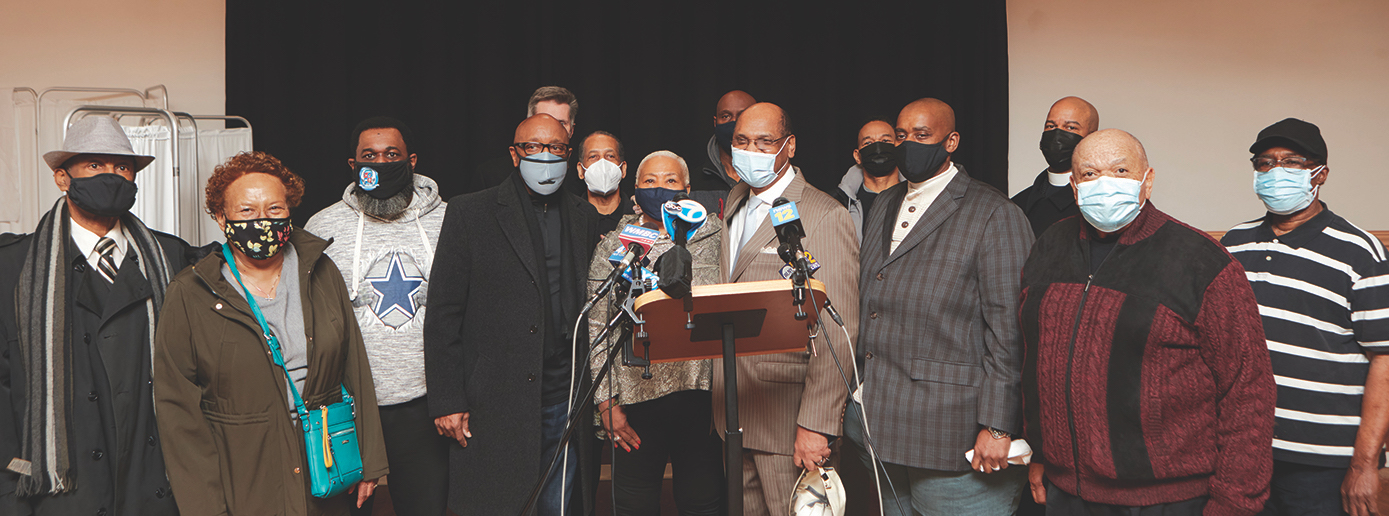
Fraser-Howze and Rev. Dr. David Jefferson Sr. (at podium), pastor of the Metropolitan Baptist Church in Newark, New Jersey, are flanked by prominent Black clergy in Newark who will be vaccinated in an effort to raise awareness and call on the state to deliver more vaccines to their communities.
Leadership in Action
Early in her career, while working as director of youth and social welfare at New York’s Urban League, Fraser-Howze created a program to help teenage parents return to high school. Later, when she witnessed the devastation of AIDS in the Black community and heard widespread misinformation about the disease—“that Black people didn’t get it, or that you could get it from a toilet bowl”—she summoned pastors, physicians, elected officials, and nonprofit leaders to a two-day retreat on Long Island and created the National Black Leadership Commission on AIDS.
Convincing Black clergy to advocate on behalf of gay and bisexual men and people who use intravenous drugs was a tough sell, she says. “You had pastors who would say, ‘God made Adam and Eve, not Adam and Steve.’ They were afraid that if they embraced the gay community, people would think they were sanctioning that lifestyle.”
Rev. Calvin O. Butts, pastor of Abyssinian Baptist Church in Harlem and cochair of Choose Healthy Life, was one of Fraser-Howze’s early allies in the fight against HIV/AIDS. “Many ministers were saying [AIDS] was a curse from God, or that to talk about clean needles encouraged drug abuse,” he recalls. “I said, ‘People are dying.’ ” Fraser-Howze had the drive and the diplomacy to bring together leaders from various denominations and across political divides, Butts says. “She was persuasive, she was sincere, and she worked hard. She knows how to help people get along better with each other.”
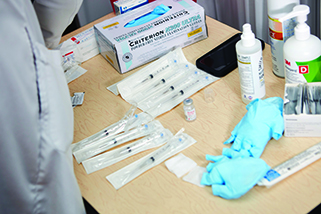
Several doses of the COVID-19 vaccine are
ready to be administered by Melinda Brown,
MD, medical director of Saint James Health.
It was the raw pain of that time that spurred Fraser-Howze to keep going: infants at Harlem Hospital who were orphaned by AIDS; mothers who were afraid to touch their HIV-positive sons. “People were very afraid of the disease. Even the undertakers and funeral parlors were afraid. It was a very sad time, and somebody had to do something.”
That era also marked the start of her working relationship with Fauci, head of the National Institute for Allergy and Infectious Diseases (NIAID). When NIAID conducted clinical trials on HIV/AIDS treatments, Fraser-Howze chaired the community constituency group, which brought activists and local leaders to the table with research scientists. It was Fraser-Howze’s role to point out disconnects between public health officials’ intentions and community members’ actual lives—for instance, to note that a young HIV-positive mother breastfeeding her child in an apartment on 125th Street in 1992 wasn’t likely to get medical information from the internet. “I helped translate the science language to the community,” Fraser-Howze says. Her skills as a liaison impressed Fauci. “She is both a visionary and practical leader, creative, resourceful, and well-respected,” he said in an email, someone who recognized that “Black leaders needed to organize to address the serious problem of HIV/AIDS in their community.”
Fraser-Howze led the National Black Leadership Commission on AIDS for 21 years; she served on presidential advisory councils on HIV/AIDS for presidents Bill Clinton and George W. Bush. Later, she was appointed to the New York City Commission on AIDS and was vice chair of the New York HIV Planning Council. In the meantime, she married and divorced—twice—and had two sons.
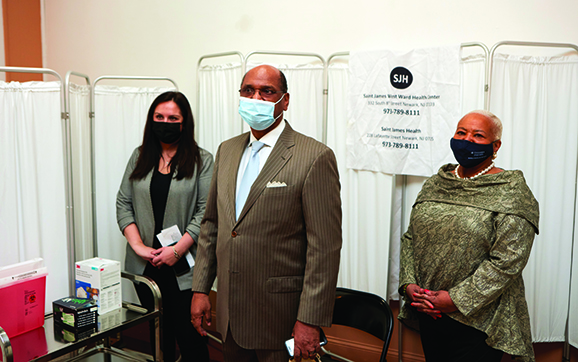
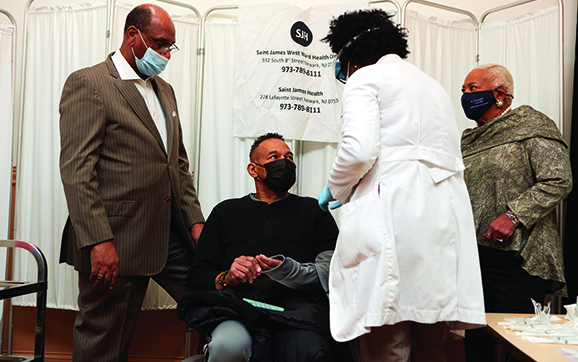
(Left) Rev. Dr. David Jefferson Sr. prepares to be vaccinated. He is joined by Nicole Fields (left), president and CEO of Saint James Health in Newark, and Fraser-Howze.
(Right) Pastor Max Johnson prepares to be vaccinated by Dr. Brown as Rev. Dr. David Jefferson Sr. and Fraser-Howze stand by.
Ascent from Tragedy
No obstacle—scarce funding, homophobia, the indifference of elected officials—deterred her. Until April 13, 2004, when her son Barron, then 25, was killed by state narcotics agents as they tried to arrest him during an undercover drug deal. “He was in his car, alone, unarmed,” Fraser-Howze says. Her rage and grief spurred what she calls “my first retirement. I just couldn’t do death and dying anymore.”
But the hiatus didn’t last long. Doug Michels, the president of OraSure Technologies in Bethlehem, Pennsylvania, which makes diagnostic tests for various medical conditions, urged Fraser-Howze to bring her passion for saving lives and her gift for community organizing to the company. She joined in 2008, remained for 10 years, and helped OraSure launch rapid in-home tests for HIV and for HCV, the virus that causes hepatitis C. She also helped secure $30 million in government funding for development of rapid tests for Ebola and Zika. “I was trying to save lives again,” Fraser-Howze says. “A lot of the work I did there, I did in memory of my son.”
Nearly four years ago, she retired from OraSure—only to embark on another lifelong ambition, another avenue for her restlessness, another place to seek justice. Fraser-Howze enrolled at Moravian Theological Seminary, not far from the home in East Stroudsburg that she shares with her 33-year-old son, Clinton. Her elder daughter, Tanya, is an actor, and the younger one, Sheena, is president/CEO of United Way New York City. “I’ve always wanted to study theology,” she says. “I’ve always been in awe of the clergy, their ability to speak truth to power and to move people. I could have gone anywhere, but I decided to stay right where I was, where I could quietly be just another student, getting all the tools I need to be a good pastor and a good leader in the church.
“Moravian is where I’m finding my peace after a tragedy no mother ever wants to face. I could be very hateful based on what happened, but something in my spirit tells me to get up and keep fighting for the right things.”
In Pursuit of Justice
Choose Healthy Life is bigger than COVID, Fraser-Howze says; it will address other health inequities—disproportionate rates of heart disease and diabetes in the Black community, for instance— that have their roots in poverty, racism, unequal housing, and other social determinants. The initiative will provide each of the 50 churches in the pilot with a public health navigator to offer education, facilitate testing, and link community members with the resources they need.
The work has already begun, with COVID testing and vaccination events held in churches that have been closed for worship since the start of the pandemic. In January, 135 people, including Choose Healthy Life cochair Rev. Al Sharpton, were tested for COVID-19 at Abyssinian Baptist Church; on Presidents’ Day, 10 Newark pastors received the COVID vaccine at the Community Care Center operated by Metropolitan Baptist Church, which is also part of Choose Healthy Life. The center will offer vaccines weekly, beginning with a 1,000-person waiting list.
Rev. Dr. David Jefferson Sr., pastor of the Metropolitan Baptist Church, says COVID has exposed the raw inequities of healthcare in America, and that Fraser-Howze is exactly the person equipped to respond. “She understands how you reach people who are in the most desperate need of services. She understands the role of the Black church and how the church has the chemistry, credibility, and trustworthiness when it comes to meeting those needs.”
When Fraser-Howze considers the multiple, intersecting crises in America and across the world—racial injustice, economic devastation, climate change, and the pandemic—she feels the opposite of overwhelmed. “It fires me up,” she says. “It makes me want to stand up for justice.” She thinks about her mentors and role models—women, mostly—who told her there was no time to waste, no room to wallow.
